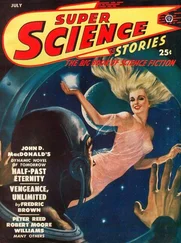So quietly uneasy were the business interests that the few tourist attractions of any dignity or legitimacy whatsoever were pointed to with more pride than they merited. (Weeki Wachee, Bok Tower, Ringling Museums — and “The Last Supper” duplicated in genuine ceramic tile.)
One motel operator on Cable Key had expressed the hidden fear to Jimmy Wing one quiet September afternoon. “Some season we’ll get all ready for them. We’ll fix up all the signs and raise the rates and hire all the waitresses and piano players and pick the trash off the beaches and clean the swimming pools and stock up on all the picture postcards and sunglasses and straw slippers and cement pelicans like we always have, and we’ll set back and wait, and they won’t show up. Not a single damn one.” He had peered at Jimmy in the air-conditioned gloom of the bar, and laughed with a quiet hysteria. “No one at all.”
And this hidden fear, Jimmy realized, was one of the reasons — perhaps the most pertinent reason — for the Grassy Bay project. Once you had consistently eliminated most of the environmental features which had initially attracted a large tourist trade, the unalterable climate still made it a good place to live. New permanent residents would bolster the economy. And so, up and down the coast, the locals leaned over backward to make everything as easy and profitable as possible for the speculative land developers. Arvida went into Sarasota. General Development went into Port Charlotte. And a hundred other operators converged on the “sun coast,” platting the swamps and sloughs, clearing the palmetto scrub lands, laying out and constructing the suburban slums of the future.
In the Palm City area it had not worked the way the downtown businessmen had hoped it would. Buck Flake had developed Palm Highlands, and Earl Ganson had set up Lakeview Village, and Pete Bender had made a good thing out of Lemon Ridge Estates, but just as fast as the population density in the newly developed areas warranted it, the big new shopping centers went in.
Grassy Bay would be an entirely different kind of proposition. It was a lot closer to downtown than the scrub-land housing. The waterfront lots would be more expensive, the houses bigger, the future residents a little fatter in the purse than the retireds who bought their budget tract houses back in the piny flats where the cattle had once grazed.
Ahead of Jimmy Wing as he waited for the light was a typical summer tourist vehicle, an old green Hudson from Tennessee, the fenders rusting, the backseat full of kids, a luggage rack on top piled high and covered with a frayed tarp. A car in the traffic headed out onto Sandy Key honked and somebody called his name, but he did not turn quickly enough to see who it was. Two cars later he recognized Eloise Cable alone in her white Karmann Ghia with the top down. The yellow scarf tied around her black hair made her face and shoulders look exceptionally brown. She grasped the wheel high and held her chin high, looking arrogant, impatient and behind schedule.
When the light changed he turned left on Bay Boulevard and drove on into the middle of the city, turned left on Center Street and drove out over City Bridge onto Cable Key. He drove a mile and a half south, past all the motels and the beach shops, the bars and the concession stands, and turned right into the long narrow sand driveway that led to his rented cottage on the bay side of Cable Key.
It was an old frame cottage of cypress and hard pine, with one bedroom, a small screened porch facing the bay. The neighbors on either side were close, but he had let the brush grow up so thickly along the property line he could not see them.
The interior of the cottage was orderly, in a cheerless, barren way. Except for a shelf of books and a rack of records, it looked as if it had been put in order to be inspected by a prospective tenant, in a semifurnished category. When the infrequent guest would comment on how it looked as if no one lived there, Jimmy Wing would be mildly surprised, but he would look around and see the justice of the accusation. When he had sold the house in town and moved out to the cottage on Cable Key two years ago, the habits he had established had been, perhaps, a reaction to the dirt, clutter and endless confusion and turmoil of those last few years of Gloria. But once he had satisfied his need for a severe order around him, the pattern had been fixed, and he had no particular reason to change it.
Breakfast was the only meal he ate at home. He was usually out of the house by ten in the morning. The four housekeeping cottages were owned by Joe Parmitter, who also owned the Princess Motel over on the Gulf side, across Ocean Road from the cottages. One of the motel maids, Loella, had a spare key to Jimmy’s cottage, and every morning after finishing up the motel rooms, she would come over and clean the cottage and make the bed.
Jimmy Wing had been for several years a reporter on the Palm City Record-Journal , the morning newspaper Ben Killian had inherited. He covered the courthouse and the city hall, the police beat, special news breaks, and did feature stories of his own devising rather than on assignment. Nearly all his work was by-lined, and his copy was clean enough and safe enough to escape rewrite. He had a desk assigned to him in the newsroom, but he did not use it very often, preferring to hammer out his copy on the old standard Underwood on the table by a living room window in the cottage. The paper went to bed at midnight, and it was the only paper in town, so the pressure was seldom noticeable.
He had learned long ago that if he spent too much time in the newspaper offices in the old pseudo-Moorish building on Bayou Street, J. J. Borklund, Ben Killian’s managing editor, would rope him into any kind of dog work available, from obits to Little League. Borklund had a double-entry approach to journalism. You squeeze every dime out of advertising and circulation, and you put the minimum back into wire services, syndicated features and operating staff. And you take an editorial stand in favor of the flag, motherhood, education, liberty and tourism, offending no one. And so the Record-Journal , on a county-wide circulation of 23,000, returned a pleasant and substantial profit each year.
Borklund had long since given up trying to make Jimmy Wing conform to his idea of proper diligence. He had given up after two disastrous weeks during which Jimmy, in order to prove his point, had reported to the newsroom every day at nine and quit at five, and had done exactly what Borklund had told him to do.
Jimmy Wing knew that the paper could not hope to acquire a man as perfectly suited to the job as he was. He had grown up in Palm City. He had an encyclopedic memory for past relationships and pertinent detail. He could transpose rough notes into solid and entertaining copy with a speed which dismayed the other reporters. When anything had to be ferreted out, he knew exactly whom to talk to. And he was able to report about 20 percent of what he learned.
But, as Jimmy Wing knew, and Ben Killian knew, and presumably J. J. Borklund knew, it wasn’t the way he had planned it. For a time it had gone according to plan. He had worked for the paper during the summers while he was at Gainesville. After graduation he went onto the paper full-time, knowing he could use two or three years of that highly practical experience before moving along to a bigger city, a bigger paper. Gloria had agreed. And during those first two years he had begun to place minor articles with secondary magazines. That, too, was part of the master plan.
In fact, he had actually resigned and had worked for seven weeks on the Atlanta Journal before Gloria had that first time of strangeness and the doctor in Atlanta had said she would be better off in the more familiar environment of Palm City. Ben Killian had been glad to get him back.
Читать дальше
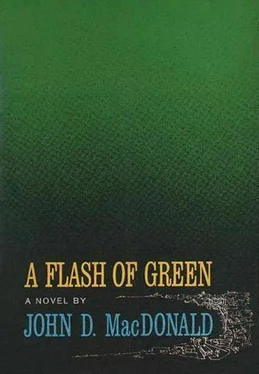
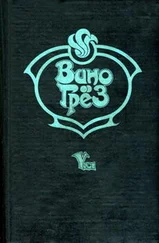
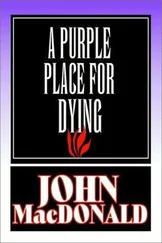

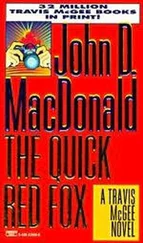





![Джон Макдональд - Wine of the Dreamers [= Planet of the Dreamers]](/books/430039/dzhon-makdonald-wine-of-the-dreamers-planet-of-thumb.webp)

